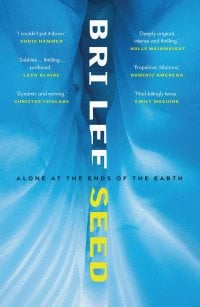As indelible images go, the hollowed eyes of a petrified seal succinctly elicit the chill of Bri Lee’s second novel, Seed, following 2024’s The Work. “It was rare, but it did happen that a single creature’s internal compass would … drag itself far from the water and into the dry valleys, towards the desert and an inevitable death alone.”
Lost deep into the continent’s frozen heart, this ill-fated mammal now functions as a wayfinder. Its arrested gaze observes the secret location of the Anarctos Project, a biodiversity-preserving seed vault not unlike that at Svalbard. That name resembles “Antarktos”, the title of an H. P. Lovecraft sonnet that in turn inspired John W. Campbell’s novella Who Goes There?, aka The Thing from Another World. But Lee’s concerns are not about aliens.
Only lightly speculative, Seed is set in a near-future in which encroaching collapse has spurred a growing antinatalism movement and reboot plans such as Anarctos. It’s here that biologists Mitchell and Frances spend their summer. Mitchell’s ex Kate, a heavily pregnant helicopter pilot, drops them off. They broke up when she chose to pursue motherhood. “I should be mad at her,” he says to Frances. “You are,” she retorts.
A cantankerous narrator, Mitchell is an unusual way into the story. Prone to bouts of casual misogyny, he’s not a million miles from the subject matter of Lee’s memoir, Eggshell Skull. He discovers a slinky cat shortly after arrival and names her Nansen, assuming she’s a peace offering from Kate. Frances isn’t impressed he keeps this contaminant. The humans have their own perfunctory arrangement: they leave their bunk doors open at night.
Halfway through, the vault’s radios are suspiciously down and Kate fails to pick up the biologists when their time is done. Did she leave Nansen, or is someone else here? Strongest in its back half as their paranoid anxiety erupts, Seed is a touch didactic in its exploration of moral quandaries and existential concerns. That’s partly down to Mitchell being a clumsy narratorial tool. Through his eyes, Frances, a woman of colour who has cast off her overbearing mother’s religious shackles, is even more thinly sketched.
If Seed’s big ideas don’t quite coalesce at the level of character, it’s nevertheless an eminently unnerving read. Drawing on Lee’s month spent in Antarctica, the novel’s sense of isolating place and panic is formidable. As the doomsday clock runs down, one last flourish of hope revealed in the pacy finale is, like that icy seal, both beautiful and grim.
Summit Books, 304pp, $34.99
For almost a decade, The Saturday Paper has published Australia’s leading writers and thinkers.
We have pursued stories that are ignored elsewhere, covering them with sensitivity and depth.
We have done this on refugee policy, on government integrity, on robo-debt, on aged care,
on climate change, on the pandemic.
All our journalism is fiercely independent. It relies on the support of readers.
By subscribing to The Saturday Paper, you are ensuring that we can continue to produce essential,
issue-defining coverage, to dig out stories that take time, to doggedly hold to account
politicians and the political class.
There are very few titles that have the freedom and the space to produce journalism like this.
In a country with a concentration of media ownership unlike anything else in the world,
it is vitally important. Your subscription helps make it possible.

Purchase this book
Seed
When you purchase a book through this link, Schwartz Media earns a commission.
This commission does not influence our criticism, which is entirely independent.
Send this article to a friend for free.
Share this subscriber exclusive article with a friend or family member using share credits.
Used 1 of … credits
use share credits to share this article with friend or family.
You’ve shared all of your credits for this month. They will refresh on November 1. If you would like to share more, you can buy a gift subscription for a friend.
SHARE WITH A FRIEND
? CREDITS REMAIN
SHARE WITH A SUBSCRIBER
UNLIMITED
Loading…



